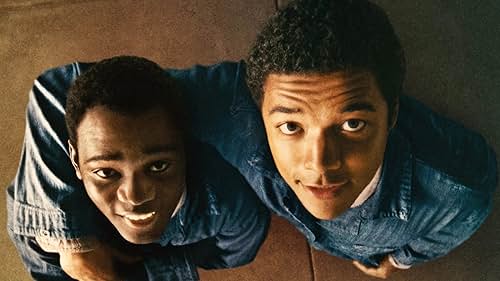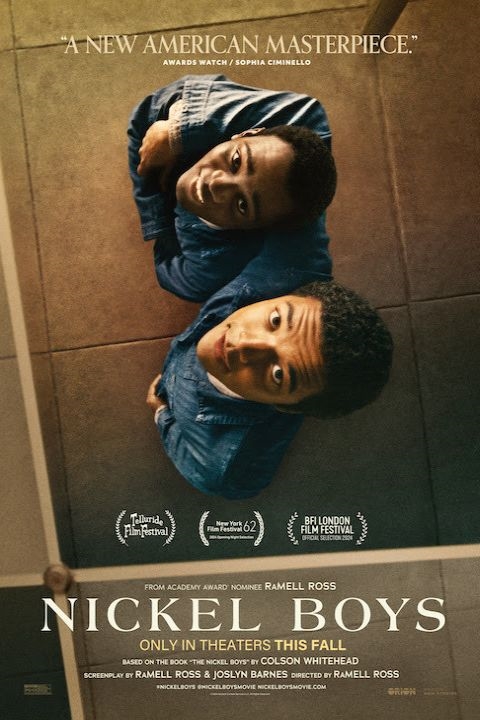Eye For Film >> Movies >> Nickel Boys (2024) Film Review
Nickel Boys
Reviewed by: Jennie Kermode

To be Black, especially in the US, is to be situated as other – to be placed outside the category of people traditionally expected to tell stories or experience life, and instead to be talked about, to be experienced by others, as we see in the classic example of the African American sidekick from whom the white Hollywood sidekick acquires a deeper understanding of himself. This creates a problem for Black storytellers, especially when creating work aimed at mixed race audiences. That problem is multiplied when the work itself deals with real life instances of (deadly) objectification, as in Colson Whitehead’s book The Nickel Boys, which draws on events at Arthur G Dozier’s Florida School for Boys between 1900 and 2011; and in RaMell Ross’ cinematic adaptation of it. Ross addresses it with a bold, experimental approach that refuses to let – any viewers – achieve a comfortable distance.
Shooting in the first person is now strongly associated with the found footage genre, which Nickel Boys is not, but it has a longer history, with critics periodically going out on a limb to say that it will change everything when, in fact, it never does. Rather than a revolutionary technique with the potential to change how we relate to cinema, it’s a practical choice for specific types of story in which perspective is key to understanding. Moustapha Akkad used it in The Message as a means of talking about the Prophet Muhammad without breaking the prohibition on depicting him visually. Julian Schnabel used it in The Diving Bell And The Butterfly to bind viewers to a character who had lost all connection to the world except his sense of sight. Here, Ross uses it to oblige viewers not just to observe the experiences of his young heroes, but to become a part of it. He does so only to break with it at unexpected moments, complicating the relationship between agency and observation as, indeed, he complicates our understanding of individual identity in a context where friendship becomes the only means of survival.
That friendship is forged between Elwood (Ethan Herisse) and Turner (Brandon Wilson), after they find themselves detained together at the Nickel School, the fictional equivalent of Dozier’s establishment. We spend the first part of the film with Elwood, wrapped up in the particularities of his day to day life, intimately involved in his small world. He’s excited at the prospect of its expansion as he goes away to college. As we move towards the big day, the frame opens up, gradually letting in more light. It seems like a natural moment to see a fine looking car, the sort of vehicle boys like that dream about. When it stops, Elwood, still unaware of so many things, accepts a ride. It turns out that the car is stolen. In the blink of an eye, his dream is shattered, and he finds himself sent away to the school where the only light to capture his gaze is on the face of Turner. Turner – with a hint, perhaps, of his namesake in Donald Cammell’s Performance – steals the gaze, and we see Elwood for the first time.
Though their connection is instant, the two boys come from very different worlds. Elwood’s perspective is shaped by his education and his ongoing dream of racial equality (a scene in which he thinks he catches sight of Martin Luther King holds a pivotal position in the structure of the piece, and is the first time that we see the two boys together). Turner has a more keenly honed survival instinct but nobody to look out for him, a fact that Elwood’s devoted grandmother (Aunjanue Ellis-Taylor) is quick to recognise. Through her visits we learn a little of what’s going on on the outside during the boys’ captivity, and catch glimpses of the way that she too is constrained and injured by a white supremacist society.
What’s going on on the onside is implied as much as it’s shown. Ross avoids objectifying his characters through the spectacle of suffering. He trusts his capable young stars to filter events through their eyes, so that much of what we understand to be happening comes from how they look at each other. Other events are glimpsed only briefly or through obstructions. Words are overheard, their meaning open to troubling inference. Only once to we get a deliberate spectacle, when the boys gather watch a boxing match arranged by the guards. The result is not what was intended and the consequences are severe, a reminder of the dangerous fragility of white audiences. Also severe, but unseen, later, is the use of a sweatbox, an instrument of torture taken straight from the plantations of the Deep South. Here the implications are clear. Both Black and white boys are held at the school, but they’re treated very differently.
Intersecting with the action are clips of one of the boys many years later, living in New York City. Played by Daveed Diggs, he gives the impression of a man caught up in the act of memory, trying to find himself within that troubled past. There are also clips from The Defiant Ones, reflections on related history and the fictions through which we process it; and there are curious little asides, such as the sight of a crocodile waddling along a city street, which might be read in any number of ways. Ross is not concerned with maintaining tight control. As in his début work Hale County This Morning, This Evening, he brings together a collage of moments, sounds and textures and ideas, not steering us but inviting us to travel in the same direction. On the few occasions that he tightens his grip, he does it so smoothly that you might not realise until much later how much of your own agency you have relinquished.
Quite aside from its subject matter, Nickel Boys is a tremendously daring film. There is no suggestion of compromise in its technique, and although it occasionally jars in the delivery, that too is something that he turns to his advantage. In his hands the characters feel volatile, never fully known, always retaining some quality that is wholly their own. They seem to exist independently of narrative, of history, making the constraints of both appear all the more unreasonable. Ross has turned a story of survival into something full of the essence of being alive.
Reviewed on: 19 Dec 2024














